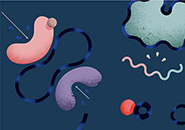
Scientific Discipline
Cancer Biology, Molecular Biology
Related Links
Host Institution
Calouste Gulbenkian Foundation
Current Position
Dr. Godinho Ferreira is a principal investigator at the Gulbenkian Science Institute (Instituto Gulbenkian de Ciência), Calouste Gulbenkian Foundation, Oeiras, Portugal.
Current Research
Consequences of Telomere Dysfunction in Cancer and Aging
Biography
If Miguel Godinho Ferreira hadn’t become a scientist, he might have been a historian. “I revel in things that are old,” he says, things that have endured through the ages, handed down from generation to generation. It’s no wonder, then, that his scientific interests center on chromosomes—the carriers of genetic information, transmitted from one generation to the next—and their role in aging and longevity.
His aim is not to turn back the clock but to gain insights into the mechanisms that cause and direct aging, insights that might lead to solutions for age-related ailments such as cancer and cardiovascular disease.
“I am most happy when I discover a new thing and share it with others,” says Godinho Ferreira, who was born and raised in Lisbon, Portugal, and credits his physician father with instilling an interest in science in him and his five siblings. “He often explained to us the wonders of how things worked in nature and, being a broad-minded person, pushed us to look for the answers ourselves.”
One of Godinho Ferreira’s major interests is telomeres, regions of DNA at the tips of chromosomes that protect against the loss or garbling of vital genetic information. Telomeres perform this protective function through self-sacrifice, giving up bits of themselves each time the cell divides, becoming shorter and shorter until they are too small to do their job. This final loss of function has been linked to the deterioration and death of cells that occurs as we grow older and may underlie the infirmities of old age.
An enzyme called telomerase prevents telomere shortening by adding back segments to telomere ends. But while this enzyme plays a fundamental role in single-celled organisms that divide indefinitely, it is absent from most types of human cells. That may not be such a bad thing. In 90 percent of cancers analyzed to date, telomerase is active, suggesting that the enzyme helps cancer cells divide uncontrollably, a key factor in malignancy.
Since establishing his Telomere and Genomic Stability Laboratory at the Gulbenkian Science Institute (Instituto Gulbenkian de Ciência) in 2006, Godinho Ferreira has concentrated on understanding the molecular mechanisms that underlie telomere protection. “I’ve been trying to figure out how cells cap chromosome ends—the mechanisms by which they prevent short or damaged telomeres,” Godinho Ferreira explains. Previously, he studied fission yeast, a single-celled organism whose chromosomes are remarkably similar to those of humans. Now he wants to expand his studies to a multicellular organism, the zebrafish, which, like humans and fission yeast, has telomeres that shorten with age.
Two main zebrafish projects are taking shape in his lab. In one, his group is using a zebrafish model of melanoma to find out whether the cancer can be controlled by inhibiting telomerase and, if so, exactly when tumors are most susceptible to antitelomerase treatment.
In the other line of work, Godinho Ferreira’s lab is investigating whether telomere shortening affects only the cell in which it occurs or if that cell also signals neighboring cells with the message, “Hey, none of us is getting any younger, you know!”
“The idea is that there may be ‘sentinel organs’ that send signals to the rest of the body so that aging is a coordinated event in the whole organism,” Godinho Ferreira explains.
Peer-to-peer communication is every bit as important on a personal level as at the cellular level, Godinho Ferreira believes. It’s a lesson he learned early in his scientific career. Through an experimental Ph.D. program run by the Gulbenkian Foundation, he became part of a community of students who were sent off to study at the best labs in the world and returned to Portugal every year to present progress reports. “This created a huge network of people in different fields,” he says. “These people are still my friends and my colleagues,” offering a pool of diverse expertise on which to draw. One such colleague, in fact, steered Godinho Ferreira toward zebrafish.
Together, these young researchers are working to revolutionize science in their home country. “There’s a new generation of scientists in Portugal that has experienced good science abroad, and we’re bringing home the ambition to effect change,” Godinho Ferreira says. “Back in school, I always heard that if you wanted to do research you would probably have to go work in other parts of the world. Being able to prove that advice wrong gives me enormous pleasure.”
Articles & News
Research Papers
Selected Research Papers



